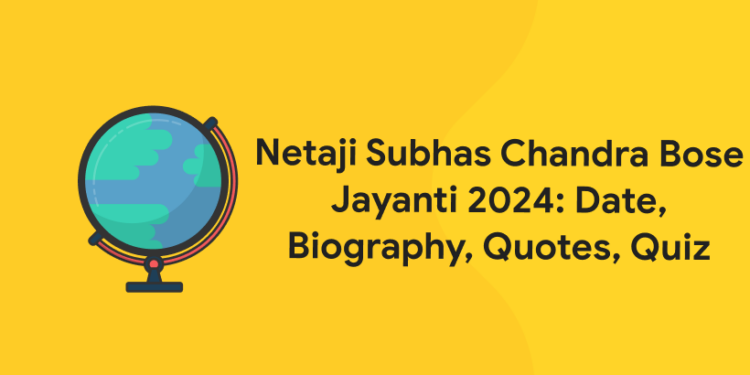Table of Contents
On January 23, 2024, people around the world will be celebrating the birthday of Subhas Chandra Bose as Netaji Subhas Chandra Bose Jayanti 2024, a prominent Indian nationalist leader who fought for India’s freedom from British rule. Bose was born on January 23, 1897, in Cuttack, Odisha, and is known for his significant contributions to the Indian independence movement. He formed the Indian National Army to fight against the British during World War II and is considered a hero by many in India. Find the brief bio of Subash Chandra Bose, the importance and significance of the day, quotes, quiz, and more!
Who is Subhas Chandra Bose?
Subhas Chandra Bose was a prominent Indian nationalist who played a key role in India’s struggle for independence from British rule. Born in 1897, Bose belonged to a family of prominent lawyers and was educated in India and England. He was deeply influenced by the teachings of Mahatma Gandhi, but his approach to the independence movement was more radical than Gandhi’s non-violent methods.
During World War II, Bose sought help from Nazi Germany and Imperial Japan to gain support for India’s independence struggle. He formed the Indian National Army (INA) in Singapore, which fought alongside the Japanese against the British. However, Bose’s wartime alliances with these authoritarian regimes left a complicated legacy marked by accusations of authoritarianism, anti-semitism, and military failure.
Despite these controversies, Bose is widely regarded as a hero among many Indians for his defiance of British authority and his commitment to India’s independence. He was given the honorific title Netaji (meaning “Respected Leader” in Bengali) by Indian soldiers of the Indische Legion and by German and Indian officials in the Special Bureau for India in Berlin. This title is now commonly used throughout India and serves as a testament to Bose’s enduring legacy as a leader in India’s independence movement.
Brief Biography of Subhas Chandra Bose
1: Who was the first woman President of India?
- Date of Birth: January 23, 1897
- Place of Birth: Cuttack, Odisha
- Parents: Janakinath Bose (father) and Prabhavati Devi (mother)
- Spouse: Emily Schenkl
- Children: Anita Bose Pfaff
- Education: Ravenshaw Collegiate School, Cuttack; Presidency College, Calcutta; University of Cambridge, England
- Political Ideology: Nationalism; Communism; Fascism-inclined
- Associations (Political Party): Indian National Congress; Forward Bloc; Indian National Army
- Movements: Indian Freedom Movement
- Religious Beliefs: Hinduism
Subhash Chandra Bose, born on January 23, 1897, in Cuttack, Odisha, India, was a towering personality in India’s freedom movement. He was a nationalist leader who left an indelible mark on India’s history. Bose was a brilliant student who completed his education in India and then went to England to study law. However, he was dissatisfied with the British rule, which he believed was exploitative and oppressive.
Bose was a charismatic and determined leader who believed in the use of force to drive the British out of India. He founded the Forward Bloc, a political party that aimed to unite all anti-British forces, in 1939. He also played a significant role in the Indian National Congress, but he broke away from the party in 1939 due to ideological differences.
Bose’s most significant contribution to the Indian freedom movement was the formation of the Indian National Army (INA), also known as Azad Hind Fauj, in 1942, with the support of the Japanese. The INA consisted of Indian prisoners of war and civilians who had fled to Southeast Asia to escape British rule. Bose hoped that the INA would be the instrument of India’s liberation from British rule.
However, the INA’s campaign in Burma and India was unsuccessful, and Bose’s health began to deteriorate. He died on August 18, 1945, under mysterious circumstances, and his death remains a subject of debate among historians. Despite his short life, Bose’s contribution to India’s freedom movement will always be remembered, and he will continue to inspire generations to come.
Free UPSKILLING Courses!
Take your first step toward mastering in-demand skills, acing interviews, and securing top-tier jobs with Entri's free upskilling courses.
Start Learning!Subhas Chandra Bose and Indian National Congress
Subhas Chandra Bose was a prominent Indian nationalist leader who played a crucial role in the Indian independence movement. He was also a member of the Indian National Congress, a political party that led the struggle for independence from British rule. Bose held several important positions in the Congress, including the presidency of the party in 1938 and 1939. He was a fierce advocate of complete independence for India and disagreed with the Congress party’s approach of seeking Dominion status within the British Empire. His differences with the Congress leadership ultimately led to his resignation from the party and the formation of the Forward Bloc in 1939.
Formation of the Forward Bloc
Subhas Chandra Bose, a prominent Indian nationalist leader, played a pivotal role in establishing the Forward Bloc in 1939. The Forward Bloc was a revolutionary socialist political party in India that aimed to unite all anti-imperialist forces under one banner. Bose formed the party with the intention of creating a united front against British colonialism and imperialism. He believed that India could only achieve independence through a sustained struggle against the British, and the Forward Bloc was his attempt to bring together like-minded individuals and organizations to fight for India’s freedom. The party’s manifesto called for the immediate end of British rule in India, the establishment of a socialist state, and the promotion of the rights of workers and peasants. The Forward Bloc played an important role in India’s struggle for independence, and Bose’s leadership was a key factor in its success.
Subhas Chandra Bose and Indian National Army (INA)- Azad Hind Fauz
Subhas Chandra Bose was a towering figure in India’s freedom struggle. He was born on January 23, 1897, in Cuttack, Odisha. Bose was a brilliant student who went on to study at the University of Calcutta, where he was drawn to revolutionary ideas and began to take an active part in the Indian independence movement.
During World War II, Bose fled to Germany to seek help from the Nazis to free India from British colonial rule. He formed the Indian Legion, which was a unit of the German Army, to fight alongside the Axis powers against the British. He then went to Japan and formed the Indian National Army (INA) with the aim of freeing India from British colonial rule.
The INA was made up of Indian prisoners of war and civilians living in Southeast Asia. Its armed forces fought alongside the Japanese forces against the British in the Burma Campaign. Bose was also instrumental in setting up the Provisional Government of Free India in Singapore, which was recognized by several countries.
Bose’s leadership and his slogan “Give me blood, and I shall give you freedom” inspired many Indians to join the freedom struggle. His death in a plane crash in August 1945 remains a mystery to this day, and his legacy continues to inspire Indians to fight for freedom and justice.
Free UPSKILLING Courses!
Take your first step toward mastering in-demand skills, acing interviews, and securing top-tier jobs with Entri's free upskilling courses.
Start Learning!Ideology of Subhas Chandra Bose
Subhas Chandra Bose was an Indian nationalist, who had a strong influence on India’s struggle for independence from British rule. He was a prominent leader in the Indian National Congress, and later founded the Forward Bloc. Bose’s ideology was based on the principles of self-determination, socialism, and secularism. He was a firm believer in the idea of a united, strong, and independent India, free from any form of foreign domination. He advocated for the use of force against the British, and sought help from foreign powers like Germany and Japan during World War II, in an effort to secure India’s independence.
Subhas Chandra Bose Quotes
- “Give me blood and I will give you freedom”
-
“No real change in history has ever been achieved by discussions.”
-
“Never lose your faith in the destiny of India.”
- “Forget not that the grossest crime is to compromise with injustice and wrong.”
- “I am not at all afraid of the uncertainty of life.”
- “The future is still in my hands.
- “A true soldier needs both military and spiritual training.”
- “Freedom is not given, it is taken.”
Subhas Chandra Bose Quiz 2024
1. Who is known as the political guru of Subhash Chandra Bose?














